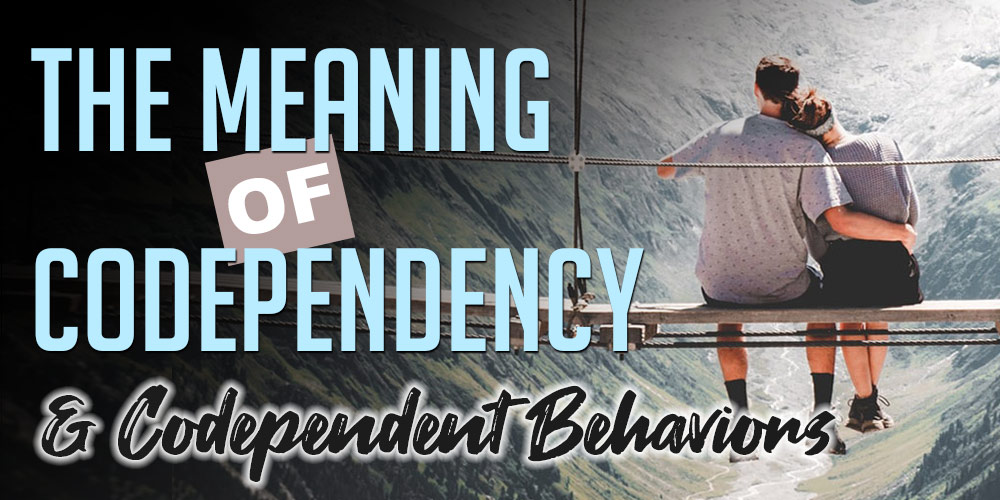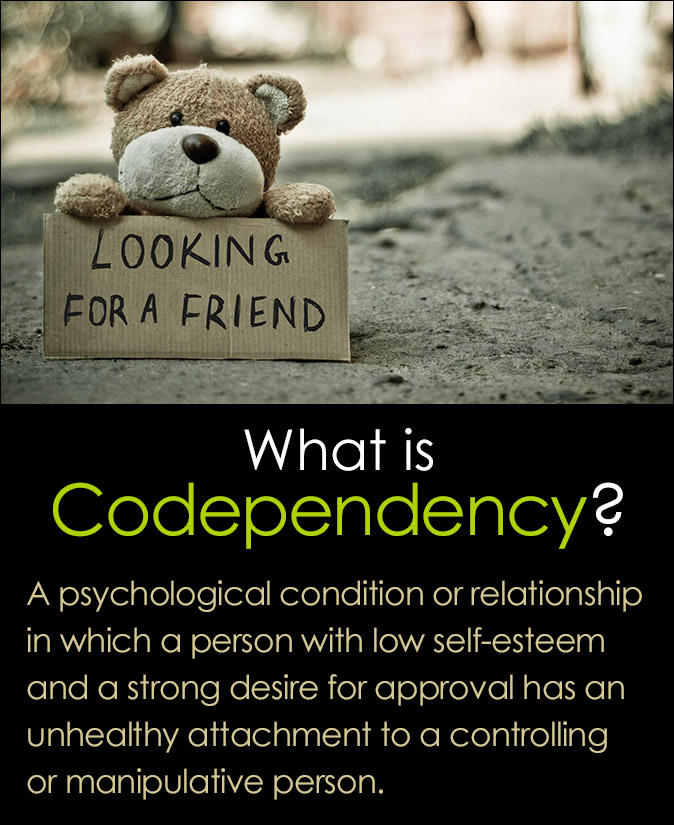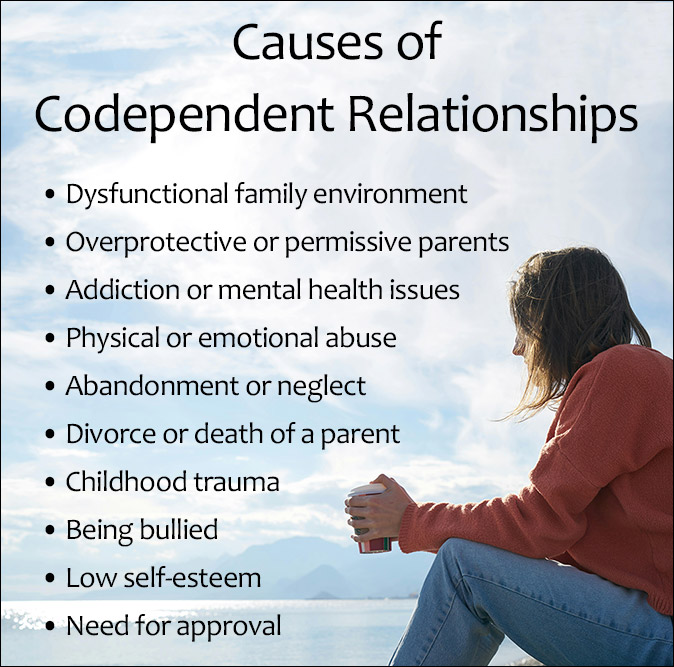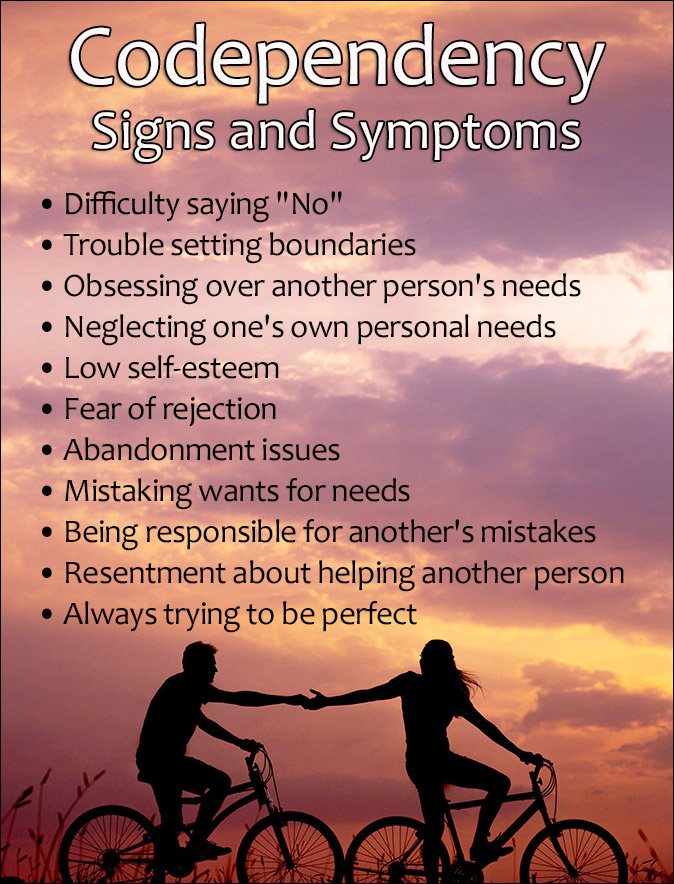
While many of us may not fully understand the meaning of codependency, we probably know people that are in codependent relationships.
Codependency is an unhealthy behavior that occurs when one person in a codependent relationship often struggles with addiction, anxiety, depression, trauma disorders, or other mental health issues.
It is not known how many families or couples are affected by this type of dysfunctional behavior, but it is probably higher than expected.
Understanding the meaning of codependency, the causes, and common codependent symptoms is necessary for creating healthier boundaries and improving emotional relationships.
What is Codependency?
Codependency is an unhealthy or unbalanced relationship that occurs when one person is overly dependent on another for emotional, physical, or psychological support.
The Merriam-Webster dictionary defines the meaning of codependency as: “a psychological condition or a relationship in which a person manifesting low self-esteem and a strong desire for approval has an unhealthy attachment to another controlling or manipulative person (such as a person with an addiction to alcohol or drugs).
Trying to meet the needs of others, while sacrificing your own needs is one sign of codependent behavior.
A codependent person is overly concerned about the thoughts and needs of others around them, such as their spouse, other family members, or even friends.
People who are codependent don’t tend to their own needs, desires, or emotions, and their identity is usually focused on helping those around them.
Features of Codependency
- Strong emotional reliance on another person
- Excessive need to control another person
- Disregard for one’s own personal needs
- Compulsive self-sacrifice

Codependent Relationships
Codependent relationships have a disproportionate balance of control and responsibility of one person or partner over another.
Relying on and taking care of others is an inherent part of human nature, but codependency is a more extreme concept that can become both painful and unhealthy.
A codependent relationship can be separated into different roles of the “enabler,” “caretaker,” and the “codependent.”
The codependency meaning of relationships can be confusing because there are overlapping similarities and differences between each person’s role.
What is an enabler and a caretaker, and how do they fit into a codependent relationship?
An enabler is an individual who empowers another person’s negative behaviors by making excuses, covering up problems, or defending and protecting them from adverse consequences.
A caretaker provides care and support, but the caretaking can become excessive and harmful in an unhealthy codependent situation.
Enabling is a type of behavior within codependent relationships where the caretaker role can lead to codependency when the caregiving becomes too focused on the other person’s needs at their own expense.
In this case, the caretaker may be motivated by a need to control the other person, or feel needed, rather than having a legitimate concern for the other person’s health and well-being.
Examples of Codependent Relationships
Codependent Behavior
A woman puts her boyfriend’s needs above her own by working long hours and neglecting her own interests to take care of her partner, even though it lets him off the hook from finding a job to pay his rent and bills.
Enabling Behavior
A mother covers for her addicted son by making excuses and bailing him out from his bad behavior, which prevents him from facing the health and legal consequences of his addiction.
Caretaker Behavior
A man constantly overlooks his wife’s excessive spending and socializing by taking on extra responsibilities around the house and with the kids but feels stressed and anxious because she is never home and avoids all of her family obligations.
All of these roles can exist in a dysfunctional codependent relationship. Rather than valuing each other’s needs equally, the codependent becomes reliant on the other person.
Codependent relationships can lead to:
- One person taking responsibility for the other person’s behavior
- Controlling their partner’s actions
- Neglecting their own personal needs or wants
- Placing a high value on being needed by the other person
Many movies about mental illness offer an excellent portrayal of the patterns and characteristics of codependency in relationships.
Difference Between Codependent vs Interdependent Relationships
There are key differences between interdependent and codependent relationships related to boundaries, control, and a sense of self.
A codependent relationship involves an imbalance of control, manipulation, and reliance on another person. Codependency sacrifices personal needs and enables unhealthy behaviors.
It lacks healthy boundaries and is one-sided, where one person gives and the other takes.
On the other hand, Interdependent relationships have equal boundaries with mutual support and shared responsibilities.
This fosters personal growth and recognizes the personal needs and wants of each individual equally.
What is The Root Cause of Codependency?
Codependency is a learned behavior that can be caused by environmental and psychological factors related to families and childhood.
It can manifest as childhood trauma in adults or issues of worthlessness or inferiority during early developmental years.
This can create symptoms of guilt and regret that push us to try harder to please others.

Causes of Codependent Relationships Include:
- Growing up in a dysfunctional family environment
- Parents that are overprotective or too permissive
- Family addiction or mental health issues
- Physical or emotional abuse
- Abandonment or neglect
- Divorce or death of a parent
- Childhood trauma
- Being bullied
- Low self-esteem
- Need for approval
These issues give rise to relentlessly striving for perfection, being in control, and grasping for feelings of self-worth, which prompts people to aim for the impossible.
The shame that we feel can make us intolerant of both our own failings and the failings of others.
One of the problems with codependency is black and white thinking, where we believe we need to sacrifice our own life for others.
In reality, we can care for ourselves and still benefit from healthy relationships without self-sabotaging behavior.
What are the Signs of a Codependent Person?
Recognizing the signs and symptoms of codependency in yourself or another person is the first step to changing codependent behavior. Here are things to look for:
- Difficulty saying “No” or setting boundaries
- Too much attention on another person’s needs
- Neglecting one’s own personal needs
- Low self-esteem
- Fear of rejection
- Abandonment issues
- Mistaking wants for needs
- Taking responsibility for another person’s mistakes
- Resentment about helping another person
- Always trying to be perfect

3 Symptoms of Codependency and Ways to Overcome Them
1. Perfectionism
Trying to be perfect can make it hard, if not impossible to achieve personal goals. People who suffer with codependency symptoms often also struggle with trying to achieve perfectionism.
This can lead to disappointment, stress, and frustration because perfection cannot be attained.
Solution: Learn to love your imperfect self and embrace your faults and shortcomings as a part of being human. Nobody is perfect and we shouldn’t expect that of ourselves either. Recognize where improvements can be made and focus on making positive steps to attaining them.
2. Control Issues
A codependent person may feel powerless to external forces, which can lead to control issues. Instead of thinking our opinions matter and we’re capable of managing our emotions, we give up our power to others.
The reason for the imbalance of power and control in codependents often stems from having power exerted over them in childhood. The concept that a child should be “seen and not heard” has a lot to answer for.
Solution: As difficult as it might seem, learn to accept your own needs and desires. Codependent people are very good at giving in to the wants and needs of others, and they must recognize their own needs have value too.
3. Longing For Approval
Constantly focusing on what is going on around us can lead to a lack of self-esteem. When we fear rejection or abandonment, we can feel an overwhelming need for external validation.
In turn, this leads to feelings of worthlessness, as we deny our own needs and desires by favoring those of others to gain acceptance.
Seeking approval can be a form of self-sabotage that means you live for what others need rather than striving for your own goals.
Solution: Decide on personal goals you want to achieve and take steps toward making them a reality.
Other Ways to Reduce Codependency
Understanding that you cannot control what other people think or feel is the first step towards recovery.
Make time to get to know yourself deeply and do the things that make you happy in life.
Self-care and self-love are not the same as being selfish. Taking responsibility for your personal health and well-being is a key to overcoming codependency and living a happy and fulfilling life.
Frequently Asked Questions
Is Codependency Considered a Mental Illness?
No, codependency is not recognized as one of the diagnosable types of mental illness according to the Diagnostic and Statistical Manual of Mental Disorders (DSM-5).
However, Dependent Personality Disorder (DPD) is a similar condition that shares some of the same codependent symptoms.
Is codependency an addiction?
No, codependency is not medically classified as an addiction even though they share some similarities such as compulsive and unhealthy behavior patterns.
How is codependency associated with substance use addiction?
Codependency and addiction are associated in a number of ways.
A codependent person supports or enables another person’s substance use as a way to maintain control. They do this by making excuses about the addiction and protecting them from negative consequences.
Codependents put the needs of the other person over their own to validate their own self-worth.
Addiction and codependency can both be caused by mental health issues such as anxiety or depression or experiencing childhood trauma.
Recovery for both conditions requires addressing negative thoughts and behaviors, learning to set boundaries, encouraging accountability, and promoting self-care.
What are some synonyms for codependent?
- Dependent
- Interdependent
- Mutually dependent
- Maladaptive
- Reliant
- Attached
- Hooked
- Interconnected
- Addicted
- Narcissistic
Can you be codependent and narcissistic?
Yes, codependency and narcissism are connected in several ways.
Both conditions share a fear of abandonment, a strong desire to be needed and validated, and a reliance on others.
In addition, both traits can be caused by childhood or relationship trauma.
Related Posts
- Overcoming Addiction Triggers - Tips for Recovery
The most difficult part of overcoming addiction and addiction triggers is making the decision to…
- Stages of Change Model in Addiction Recovery
In the journey from substance use addiction to recovery, every person experiences changes in their…
- 12 Ways to Improve Life After Rehab for Addiction
Most people agree that completing an addiction treatment program can be difficult, but it is…
